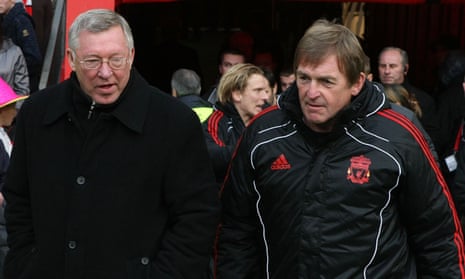The Centenary Stand at Anfield becomes the Kenny Dalglish Stand on Friday and the guest list for the renaming ceremony both confirms and challenges the Scot’s reputation at Liverpool. Steven Gerrard and Jamie Carragher will be there at Dalglish’s request, so too Alan Hansen, former chief executive Peter Robinson and long-serving members of the Melwood canteen, Carol and Caroline. It will be the presence of Sir Alex Ferguson and Sir Bobby Charlton, however, that underlines how respect can transcend rivalry. Eventually.
There was a time when the relationship between Dalglish and Ferguson reflected the hostility between Liverpool and Manchester United, who renew their fractious rivalry on Saturday at Anfield. No longer. Time has not been the healer so much as stepping away from the pressures of management and having to fight their respective corners. It matters to Dalglish that his old adversary from Old Trafford has agreed to visit Merseyside 24 hours early, along with Charlton, two days after the United legend celebrated his 80th birthday.
“Fergie’s actions speak louder than 1,000 words, him and Sir Bobby coming over,” Dalglish said. “They did exactly the same after Hillsborough. They were over here early doors. There is rivalry on and off the pitch but when it comes to something like that there is not even a doubt about it – they will be over here supporting us and hopefully we would do the same for them.
“The show was never about us. We never made the show. We did our jobs. We defended our football clubs, our fans, as best we could. We are probably both more balanced now but it is part of your job to represent your football club as best you can, on and off the pitch. I think most people who come out of football are more relaxed, myself included.”
Tensions between the two Glaswegians were not confined to the Liverpool-United power struggle and Ferguson’s mission to knock the Anfield club off their perch. “I don’t even remember him saying that comment – it wouldn’t have registered with me,” Dalglish claimed.
They opposed each other in a Celtic-Rangers reserve-team game in 1969 when the young striker was shifted into central defence to mark the senior, frustrated Ferguson. They opposed each other for the signatures of Alan Shearer and Roy Keane when Dalglish was manager of Blackburn Rovers, winning one apiece. There was friction over Dalglish’s decision to have knee surgery that ruled him out of Ferguson’s Scotland squad for the 1986 World Cup and numerous spats played out in the press. But there was always respect and now, perhaps, there is also a shared recognition they are footballers from a very different era.
Dalglish said: “How can you criticise someone who is totally supportive of his club? That is what you want as a supporter – someone who is defensive of your club and wants to make a contribution. He made a massive contribution to Manchester United.
“Away from working, there has never been a problem with him. If someone came to manage Liverpool and never stood their corner, I don’t think the punters would be happy with that. He was exactly the same for Manchester United. After the end of a game we would always have a drink. Every time.
“When I came back [to manage Liverpool in 2011] and we had that first game at Old Trafford he shouted to me as I was walking on to the pitch: ‘Are you coming in for a drink after?’ I said: ‘What do you mean? I’ve always been in for a drink.’ He says: ‘Aye, but it’s changed a wee bit now.’ ‘Not for me it hasn’t,’ I said. You never spoke about football. You never spoke about what happened out there, otherwise you’d end up arguing. He represents his club fantastically well and I have tried my best to represent the club I was at. I don’t see anything wrong with that.”
Dalglish continues to defend Liverpool’s corner, insisting Jürgen Klopp is “the perfect fit for the football club” and backing the club’s summer transfer strategy. “If you cannot find someone who is better than what you have, why would you go and buy them?” he says.
It was in Klopp’s Melwood office last season that Dalglish discovered a stand was to be named in his honour by Liverpool. The decision by Fenway Sports Group, the club’s owner, rewarded Dalglish’s contribution to Liverpool and the success of his wife’s charity, the Marina Dalglish Appeal, in funding a new £1.5m chemotherapy unit at Aintree Hospital. “It is for all the family and I am immensely proud, but embarrassed as well,” he said. “Someone helped Marina and all we did is what I think most people would do and show our appreciation.”
As for being informed of FSG’s decision via a video call from John W Henry and Tom Werner, the Liverpool legend recalled: “John started speaking and I thought: ‘Jesus, what have I done now?’ I thought I was getting the sack again but it was a happy story this time. I wonder how long my name will stay up there?” It should be there for as long as Anfield exists.
